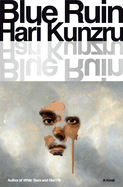
In Blue Ruin, Hari Kunzru's heady and pitiless peak-pandemic-era novel of art and commerce, the direness of poverty weighs no more heavily than the twining crises of tarnished ideals and squandered talent.
The pandemic is raging when narrator Jay Gates--a middle-aged, biracial, English-born New Yorker and fallen art star--finds himself delivering groceries and living in his car. A delivery to a lake house outside the city brings him face-to-face with his ex-girlfriend Alice, whom he hasn't seen in two decades; she has since married Rob, once Jay's closest friend. The couple has borrowed the lakeside property to escape the virus-permeated city and enable Rob, a successful painter, to work immersively. When Alice realizes that Jay, still recuperating from Covid-19, is in no condition to finish his deliveries, she lets him stay on the property. Her effort to keep his residence a secret from Rob and Rob's paranoid gallerist is as doomed as it sounds.
The details of Jay and Alice's breakup, which he recollects at length, delay answers to Blue Ruin's tantalizing questions: Why did Jay disappear from the art scene, and how did he end up homeless? Kunzru (White Tears; Red Pill) dexterously blends all the novel's concerns in a knockout finale centered on the sale of a painting. Jay may no longer be famous, but he understands the nature of modern celebrity: "Only in the system we have, where everyone is expected to be an entrepreneur of the self, is anonymity a kind of death." --Nell Beram, author and freelance writer

